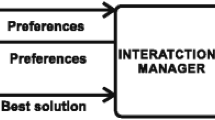Abstract
Scrum is an agile software development framework followed nowadays by many software companies worldwide. Since it is an iterative and incremental methodology, the software is developed in releases. For each release, the software development team and the customer agree upon a development plan. However, the context of the software project may change due to unpredicted circumstances that generally arise, for example, new software requirements or changes in the development team. Consequently, these factors force the release plan to be adjusted. When the release plan is modified, it is necessary to consider at least four criteria to minimize the economic and operational impact of these changes. Therefore, this activity can be analyzed as a multi-objective problem. In the last three decades, multi-objective evolutionary algorithms have become an effective and efficient tool to solve multi-objective problems. In this paper, we evaluate three multi-objective optimization approaches when solving the release plan rescheduling problem. Mainly, we focus our investigation on analyzing the conflict between the considered objectives and on the performance of the Pareto-based, the indicator-based, and the decomposition-based multi-objective optimization approaches.
Access this chapter
Tax calculation will be finalised at checkout
Purchases are for personal use only
Similar content being viewed by others
References
Beume, N., Naujoks, B., Emmerich, M.: SMS-EMOA: multiobjective selection based on dominated hypervolume. Eur. J. Operat. Res. 181(3), 1653–1669 (2007)
Bonferroni, C.E.: Teoria statistica delle classi e calcolo delle probabilita. Pubblicazioni del R Istituto Superiore di Scienze Economiche e Commerciali di Firenze 8, 3–62 (1936)
Coello Coello, C.A., Reyes Sierra, M.: A study of the parallelization of a coevolutionary multi-objective evolutionary algorithm. In: Monroy, R., Arroyo-Figueroa, G., Sucar, L.E., Sossa, H. (eds.) MICAI 2004. LNCS (LNAI), vol. 2972, pp. 688–697. Springer, Heidelberg (2004). https://doi.org/10.1007/978-3-540-24694-7_71
Deb, K., Pratap, A., Agarwal, S., Meyarivan, T.: A fast and elitist multiobjective genetic algorithm: NSGA-II. IEEE Trans. Evol. Comput. 6(2), 182–197 (2002)
Escandon-Bailon, V., Cervantes, H., García-Nájera, A., Zapotecas-Martínez, S.: Analysis of the multi-objective release plan rescheduling problem. Knowl.-Based Syst. 220, 106922 (2021)
Ishibuchi, H., Imada, R., Masuyama, N., Nojima, Y.: Comparison of hypervolume, IGD and IGD+ from the Viewpoint of optimal distributions of solutions. In: Deb, K., et al. (eds.) EMO 2019. LNCS, vol. 11411, pp. 332–345. Springer, Cham (2019). https://doi.org/10.1007/978-3-030-12598-1_27
Ishibuchi, H., Masuda, H., Tanigaki, Y., Nojima, Y.: Modified distance calculation in generational distance and inverted generational distance. In: Gaspar-Cunha, A., Henggeler Antunes, C., Coello, C.C. (eds.) EMO 2015. LNCS, vol. 9019, pp. 110–125. Springer, Cham (2015). https://doi.org/10.1007/978-3-319-15892-1_8
Jahr, M.: A hybrid approach to quantitative software project scheduling within agile frameworks. Project Manag. J. 45(3), 35–45 (2014)
Nigar, N.: Model-based dynamic software project scheduling. In: Proceedings of the 2017 11th Joint Meeting on Foundations of Software Engineering, pp. 1042–1045. ACM (2017)
Roque, L., Araújo, A.A., Dantas, A., Saraiva, R., Souza, J.: Human resource allocation in agile software projects based on task similarities. In: Sarro, F., Deb, K. (eds.) SSBSE 2016. LNCS, vol. 9962, pp. 291–297. Springer, Cham (2016). https://doi.org/10.1007/978-3-319-47106-8_25
Savelsbergh, M.: A branch-and-price algorithm for the generalized assignment problem. Operat. Res. 45(6), 831–841 (1997)
Schwaber, K., Sutherland, J.: The scrum guide. the definitive guide to scrum: The rules of the game. (2020)
Vega-Velázquez, M.Á., García-Nájera, A., Cervantes, H.: A survey on the software project scheduling problem. Int. J. Prod. Econ. 202, 145–161 (2018)
Wilcoxon, F.: Individual comparisons by ranking methods. Biomet. Bull. 1(6), 80–83 (1945)
Zapotecas-Martínez, S., García-Nájera, A., Cervantes, H.: Multi-objective optimization in the agile software project scheduling using decomposition. In: 2020 Genetic and Evolutionary Computation Conference Companion, pp. 1495–1502 (2020)
Zhang, Q., Li, H.: MOEA/D: a multiobjective evolutionary algorithm based on decomposition. IEEE Trans. Evol. Comput. 11(6), 712–731 (2007)
Author information
Authors and Affiliations
Corresponding author
Editor information
Editors and Affiliations
Rights and permissions
Copyright information
© 2021 Springer Nature Switzerland AG
About this paper
Cite this paper
García-Nájera, A., Zapotecas-Martínez, S., Falcón-Cardona, J.G., Cervantes, H. (2021). Multi-objective Release Plan Rescheduling in Agile Software Development. In: Batyrshin, I., Gelbukh, A., Sidorov, G. (eds) Advances in Computational Intelligence. MICAI 2021. Lecture Notes in Computer Science(), vol 13067. Springer, Cham. https://doi.org/10.1007/978-3-030-89817-5_30
Download citation
DOI: https://doi.org/10.1007/978-3-030-89817-5_30
Published:
Publisher Name: Springer, Cham
Print ISBN: 978-3-030-89816-8
Online ISBN: 978-3-030-89817-5
eBook Packages: Computer ScienceComputer Science (R0)




